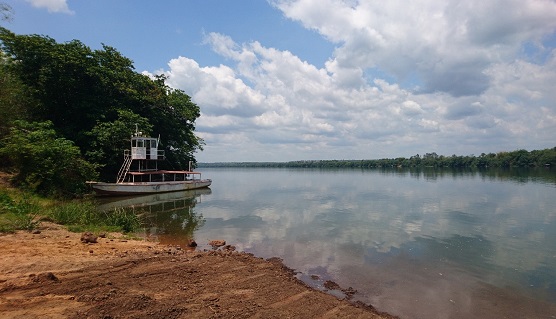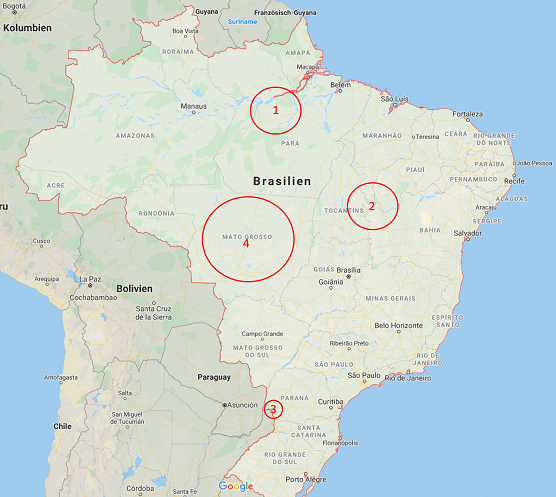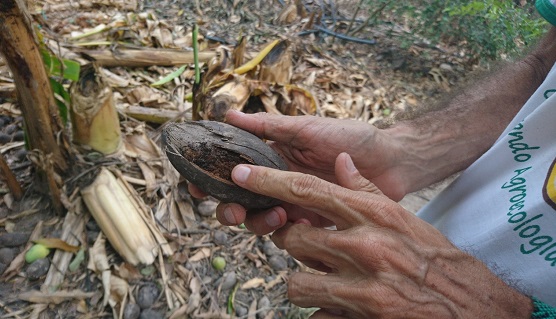
© Theresa Tribaldos
The Just food case study in Brazil looks at different soybean production systems and investigates their impacts on food system sustainability.
Soybean is an important ingredient for animal feed in Europe and many other countries around the world. This has fuelled the spread of agro-industrial commodity production in Brazil. Large-scale cultivation of soybean in Brazil has been maintaining a constant territorial expansion, with strong socio-environmental impacts.
The planted area increased from about 11 million hectares in 1997 to around 36 million hectares in 2019, advancing in areas of the Cerrado (savannah) and Amazon biomes. This expansion has experienced a strong boost from the Brazilian government and has severe impacts on social-ecological systems in different states and biomes in Brazil. These range from deforestation, water pollution and contamination due to agrochemicals to loss of biodiversity, land pressure and compromising of diversified food production. Furthermore, displacement of local people and loss of traditional livelihoods are consequences of expanded cultivation of soybean.
Varying regions and biomes in Brazil in the focus
"We are studying the impacts of transgenic, non-transgenic, large-scale, family farming and organic soybean production in terms of food system sustainability and transition in a context of deep inequalities", says Dr Theresa Tribaldos, the leader of this case from the Centre for Development and Environment (CDE) at the University of Bern.
There are four study sites which have slightly varying research foci:
- The expansion of large-scale soybean monoculture and livestock in the Amazon region in the state of Para. In this area, the attention lies on deforestation and water pollution due to agrochemicals, the displacement of traditional food production for animal grazing, soybean growing, and the construction of large logistic infrastructure, which are all interlinked.
- The expansion of soybean cultivation in the Cerrado biome in a region called MATOPIBA, the border area between four different Brazilian states (Maranhão, Tocantins, Piauí and Bahia). Here, the focus is on socio-environmental impacts of soybean monoculture and associated conflicts with family farmers and traditional people living in this area.
- Organic soybean production in the municipality of Capanema (state of Paraná), in the Southern part of Brazil. This part looks at the impacts of organic soybean growing for human consumption and the opportunities this creates for family farmers in the surrounding area.
- Certified, non-transgenic soybean growing for a European market in the state of Mato Grosso, Centre-Western region of Brazil. The main question in this context concerns the impacts of this specific type of production and the conditions for soy producers. Is certified soybean cultivation more sustainable and just than transgenic soybean production? Can we see differences in the profiles of soybean producers between non-transgenic soybean and transgenic soybean?

Four study sites on a map of Brazil. © Google Maps
"Stakeholders of the study include family farmers, settlers of the agrarian reform, indigenous and traditional people, NGO as well as academics and members of state administrations", explains Professor Renato Maluf, the head of the research group which is our case study partner in Brazil. The research team includes Dr Rosangela Cintrao, Dr Mariana Santarelli, Emilia Jomalinis, Dr Luciene Burlandy, and Silvio Porto. The group is associated to the Reference Centre on Food and Nutrition Sovereignty and Security (CERESAN) which is attached to the Federal Rural University of Rio de Janeiro (UFRRJ).
Field work will start in the autumn 2020
The work has started with the appropriation of the Just food projects' theoretical and methodological framework with a view to its application in the Brazilian context in the following main themes.
First, the meanings of just transition as well as food justice and social inequalities in food systems were examined. Then, the references to justice, sovereignty, security, and rights in relation to food, their complementarities and main social actors were identified.
In addition, the team has familiarized with environmental justice and conflicts as well as the nutritional dimensions of food system transitions.
A parallel effort has been made in order to prepare the field work by collecting and systematizing available data and information on the four areas.
Field work will be started during the autumn 2020 in the Amazon region in Para and the municipality of Capanema in the Southern region, with interviews with relevant stakeholders in the field.

© Theresa Tribaldos
New concepts to Brazilian debate on food and nutrition
Food justice and just transition are concepts with limited use in Brazil yet, where other references such as sovereignty, security and human rights are more frequent. Thus, the Just food project will make an important contribution to the debate in Brazil on issues related to agriculture, food and nutrition, considering the context of profound social inequalities.
The Reference Centre on Food and Nutrition Sovereignty and Security (CERESAN/UFRRJ-UFF) has a widespread group of associated researchers in Brazil and abroad who will participate in seminars and other events for discussions about projects' research questions and outcomes.
The Brazilian case study makes an important contribution to the Just food project by shedding the light on international value chains and related questions of power, inequalities, and human rights violations. These are important aspects of national food systems in Europe, especially for countries importing large amounts of food and feed from abroad.
More information
- Senior Research Scientist, Dr Theresa Tribaldos, firstname.lastname@cde.unibe.ch, tel. +413 1631 8822